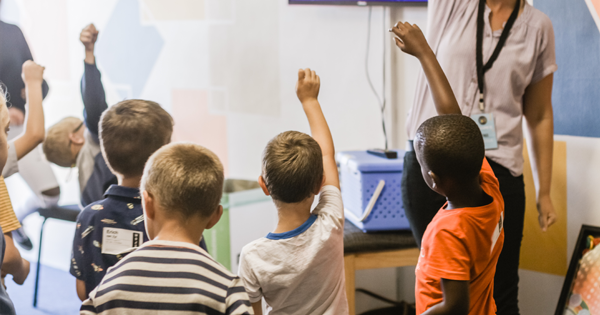It’s the first week of September. For me, that means the first week of school, while for many teachers it means week 2, 3, or even 4. Most educators have begun to settle into routines. Our students are no longer strangers, though we may still be getting to know who they REALLY are. We are beginning to get a feel for the year, and the people who we serve.
Years ago, I read a book that I do not remember, except for one piece of advice for teachers: start your year FIRM, and make friends later. The children need to know who is boss. During over more than 20 years of teaching, I have realized both the truth in this statement and the downfalls. Yes, we need to start the year being VERY clear with rules and boundaries, but we can ALSO be friendly, caring, and compassionate. There is nothing wrong with smiling on day one, and in fact, I think there is a LOT wrong with choosing NOT to.
Like many blog posts that I write, this one was prompted by an incident. The kind that does not make me happy. The kind that gets my Mama Bear riled up. I am going to be very vague about the details of said incident, but I promise to be very specific about the advice for educators that I want to give.
So, here are my five things NOT TO EVER DO AGAIN while teaching and/or working with children (or adults, for that matter).
1 – Don’t use manipulation as your primary classroom management system.
Every person who gets a degree in education learns about classroom management, which usually involves some combination of rewards and punishment. While I come from a very different perspective these days – namely that neither of these are needed at all – I understand that the job of getting a group of 20-40 children to do what you are required to get them to do can be daunting, and sometimes we need to use rewards to encourage them.
However, when the primary focus of your system is “don’t get in trouble or you will miss out on the reward,” you are setting yourself – and your students – up for failure.
In the incident I mentioned, a teacher has a card system for her classroom of 7-8 year old students. The ‘reward’ is a once a month party of some sort, which in itself is problematic given the age of the students and their lack of ability to wait an entire month to be rewarded for good behavior.
The system does not include short term rewards, but rather sets children up for a very difficult task: be really good for a month, and you will get rewarded. So, if Sally has a bad day on the 6th of October, she has zero motivation to do any better until the 31st. The child (we will call them L) involved in the incident is not petrified of “messing up”, which brings me to item 2.
2 – Don’t use fear to manipulate students.
I know, it sounds like a no-brainer, but apparently it needs to be spelled out. If your students are afraid of you, they are wasting their time, energy, and talents on NOT ANGERING YOU instead of doing great work or becoming awesome people. If they are afraid of your system, the same effect is going to be present.
L is now afraid of both the teacher and the system in question. L is afraid that the teacher will be angry, AND afraid of missing the party. So much so, that L is now having bathroom accidents at school. L has never had this problem before.
3 – DO NOT withhold bathroom privileges, or assign a negative consequence to a child who has biological needs.
Just don’t. Years ago I read an article about high school students who were getting kidney infections from holding their bladders, because using a bathroom pass during class invoked a loss of grade points. These teens were getting sick in order to maintain their GPA’s. It wasn’t an isolated incident of one valedictorian somewhere, either. It was a widespread issue across the country.
And we REALLY don’t need to be telling young children that they cannot pee when they need to. If a child is using the bathroom as a way to get out of class, talk to him or her alone, and get the issue resolved. Otherwise, let them go to the bathroom for goodness sake.
4 – Do not use humiliation to get compliance from students.
This is a big one, because what I notice often is that educators and parents don’t even realize that they are doing this! If you are doing something that is embarrassing a child, stop it. Find another way to handle the situation.
Depending on the child, you are either going to get even more push-back, or you are going to see withdrawal. Neither is useful for addressing an issue. It can be difficult to find a moment to talk to a student one-on-one, but it isn’t impossible. At this stage of the year, I feel it is critical.
There are moments when we have to call out a behavior in front of an entire class – we can’t stop teaching every five minutes to take Johnny aside and address his fidgeting.
Generally though, if the conversation involves shaming a child in front of her/his peers, don’t do it. If the action a child has to take to move a card from green to yellow is done with all of the other students watching, don’t do it. Don’t take a child’s desk away, showing every other child that L is a bad kid and doesn’t even deserve a desk. There are many effective ways to address behavior issues. Shaming children isn’t one of them. Which leads to my last piece of advice:
5 – If you cannot attend to the basic health and safety of your students, get out of education NOW.
Educators have long lists of things they need to accomplish in a year, but there is NOTHING more important that students being safe and healthy. Besides, when kids aren’t safe, none of that other learning is going to happen anyway.
If a child can wet him/herself in your classroom and you don’t notice it all day, you aren’t doing your job. If you don’t see the hungry child with no lunch, you aren’t doing your job. If you don’t notice the bruises on the arms of the child who is being abused, you need a new career.
What to DO as an Educator and Teacher:
That’s my list of don’ts. Many are so obvious I hate to even say them, but they need to be said. In fact they WILL be said to a particular educator early next week. My list of DO’s is much simpler:
- DO be compassionate with the people in your life, of any age.
- DO listen.
- DO be proactive when you see a problem arising.
- DO connect one-on-one with each person you are working with.
- DO make health & safety a priority.
- DO teach because you love it, and not for any other reason.
- DO let kids use the bathroom (seriously!).
- DO find ways to acknowledge the positive.
- DO work with parents when there are problems to be solved.
Simple, right? And you will find, if you read all of this again, that you can take teaching & children out of the equation, and it can apply to almost any other situation in life. Use compassion. Connect. Work with others to solve problems. Be proactive. And parents, if your child is struggling in school, academically, socially, or with a teacher, PLEASE be an advocate. Don’t back down until you find ways for your child to feel fully supported. They need us!


Recent Comments